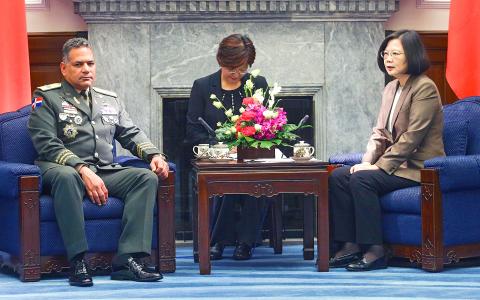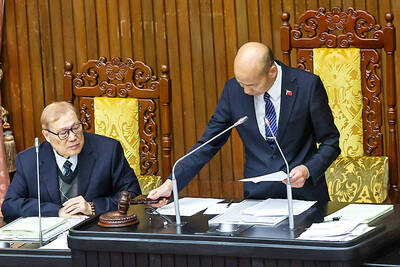Taiwan will continue to increase military spending as it works to strengthen its national defense capabilities, President Tsai Ing-wen (蔡英文) yesterday told a delegation from a Washington-based think tank, while the Ministry of National Defense said it was closely monitoring Chinese military planes and navy vessels during their exercises near Taiwan.
Meeting with Hudson Institute president Kenneth Weinstein and others with his group, Tsai said Taiwan maintains stable and close economic and regional security relations with the US.
As head of state, one of her priorities is to strengthen Taiwan’s defensive capabilities and promote the development of its defense industry, and the government plans to increase its defense budget to enhance military training and boost military morale, she said.

Photo: CNA
Taiwan has made many efforts in this area, Tsai said, adding that she looks forward to receiving suggestions from the institute, particularly in the fields of military reforms and cooperation to strengthen regional peace and stability.
She did not give any figures, but in March the government suggested it wanted to increase defense spending from 2 percent of GDP to about 3 percent of GDP, which would mean a 50 percent increase in defense spending.
However, the Ministry of National Defense’s proposed budget for fiscal 2018, which it submitted earlier this month, was for NT$327.8 billion (US$10.83 billion), an increase of 1.9 percent over its NT$321.7 billion budget for this year.
Meanwhile, ministry spokesman Chen Chung-chi (陳中吉) said China’s far-sea training activities that bring its fighters and vessels near Taiwan are expected to become routine and the defense forces have a set of response options.
Chen made the remarks in response to reporters’ questions following a news conference in Beijing on Sunday on the sidelines of the Chinese Communist Party’s 19th National Congress on the theme of “solid strides on the path of building a powerful military with Chinese characteristics.”
People’s Liberation Army (PLA) Air Force bomber pilot Liu Rui (劉銳) told the news conference that since the PLA expanded its far-sea training to the deep seas several years ago, it has made such deployments a routine part of its live-fire exercise cycles.
The Chinese military would continue to expand its far-sea training, increase the frequency of such training activities and increase the scale of its exercises, Liu said.
PLA aircraft and vessels have several times flown or sailed near southern Taiwan and into the Western Pacific via the Miyako Strait, which lies between the Japanese islands of Miyako and Okinawa, and is part of Japan’s exclusive economic zone, but includes a narrow band of international waters and airspace.
Chinese fighter jets and ships have also regularly crossed the “first island chain,” which refers to the first major archipelagos off the East Asian continental mainland, including the Japanese archipelago, the Ryukyu Islands, Taiwan and the northern Philippines.
Chen said that the military is closely monitoring the air space and seas above and around Taiwan, and has a range of responses.
He also urged the public to support the government’s efforts to develop a more independent defense sector and asymmetric warfare capabilities.

DEFENDING DEMOCRACY: Taiwan shares the same values as those that fought in WWII, and nations must unite to halt the expansion of a new authoritarian bloc, Lai said The government yesterday held a commemoration ceremony for Victory in Europe (V-E) Day, joining the rest of the world for the first time to mark the anniversary of the end of World War II in Europe. Taiwan honoring V-E Day signifies “our growing connections with the international community,” President William Lai (賴清德) said at a reception in Taipei on the 80th anniversary of V-E Day. One of the major lessons of World War II is that “authoritarianism and aggression lead only to slaughter, tragedy and greater inequality,” Lai said. Even more importantly, the war also taught people that “those who cherish peace cannot

STEADFAST FRIEND: The bills encourage increased Taiwan-US engagement and address China’s distortion of UN Resolution 2758 to isolate Taiwan internationally The Presidential Office yesterday thanked the US House of Representatives for unanimously passing two Taiwan-related bills highlighting its solid support for Taiwan’s democracy and global participation, and for deepening bilateral relations. One of the bills, the Taiwan Assurance Implementation Act, requires the US Department of State to periodically review its guidelines for engagement with Taiwan, and report to the US Congress on the guidelines and plans to lift self-imposed limitations on US-Taiwan engagement. The other bill is the Taiwan International Solidarity Act, which clarifies that UN Resolution 2758 does not address the issue of the representation of Taiwan or its people in

The Philippines yesterday criticized a “high-risk” maneuver by a Chinese vessel near the disputed Scarborough Shoal (Huangyan Island, 黃岩島) in a rare incident involving warships from the two navies. The Scarborough Shoal — a triangular chain of reefs and rocks in the contested South China Sea — has been a flash point between the countries since China seized it from the Philippines in 2012. Taiwan also claims the shoal. Monday’s encounter took place approximately 11.8 nautical miles (22km) southeast” of the Scarborough Shoal, the Philippine military said, during ongoing US-Philippine military exercises that Beijing has criticized as destabilizing. “The Chinese frigate BN 554 was

LEISURE: The new law adds Confucius’ birthday, the anniversary of the Battle of Guningtou, Constitution Day and Little New Year as national holidays The Legislative Yuan yesterday passed new legislation adding four national holidays and making Workers’ Day a national holiday for all sectors. The Chinese Nationalist Party (KMT) and the Taiwan People’s Party used their combined majority in the legislature to push the jointly proposed draft through its third and final reading. This new law supersedes the existing regulations for the implementation of memorial days and state holidays, which are administered by the Ministry of the Interior. The new law recognizes Confucius’ birthday on Sept. 28, the anniversary of the Battle of Guningtou on Oct. 25, Constitution Day on Dec. 25 and “Little New Year,”